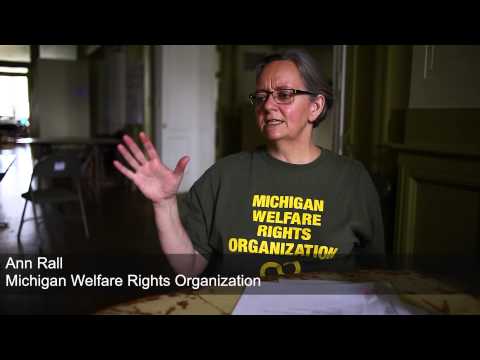As a civil-rights lawyer, I’ve dedicated my career to battling back the infuriating unfairness that runs rampant through our society. As a black woman, I’ve experienced for myself the sting of racism and know just how depressing and disempowering such hateful bias can feel.
But when it comes to the water shut-offs I’ve seen taking place around Detroit—shut-offs that I’m fighting to end as an attorney with the ACLU of Michigan—I find myself feeling angrier and sadder than usual. With every meeting about the issue that I attend, I find myself leaving more bitter, more enraged and more heartbroken than the day before.
Finally, I’ve figured out why: I’ve never before been faced with how devastating our government’s lack of regard for poor people can be—especially when the poor are also people of color.
Before moving to the Midwest, I had been insulated from many of the problems that the extremely poor in the African-American community face on a daily basis. Growing up in Southern California, I typically found myself in social situations where I did not see any other black people. Years later, attending school in Atlanta and Washington, D.C., I met many more blacks—but most of them were highly educated and affluent.
Yes, there were discussions of the effects of racism in these settings. And to be sure, my friends and I were angry about social inequality. But we were mostly mad that education and affluence had not facilitated our full acceptance into society, that our white bosses and colleagues still treated us as inferiors and relegated us to the fringes of the workplace, that our white neighbors still cringed when they saw us moving into the house next door.
Poverty, however, was largely an academic discussion to me, an abstraction I understood primarily from college courses examining the intersection between race and class. I thought that, because racism is the root cause of much of the poverty in the African-American community today, eliminating racism would automatically result in the elimination of poverty. Therefore, I assumed, there was no need to think about ways to combat poverty head-on.
Living in Detroit, I realize now just how misguided that assumption was.
Here in Detroit, I see poor people who are going on month three with no water. I see a water department that has not come up with any workable system for restoring water service to the poorest people. I see a mayor whose only answer is to offer a payment plan for restoration of service—a useless solution for those whose water was turned off because they lacked the means to pay one of the country’s highest water bills in the first place.
I see children, the elderly, the sick, and tons of others who are now being forced to do the impossible—learn to live without water.
Given that it’s literally impossible to have life without water, I don’t see how this does or should make sense to anyone.
But whether the powers that be find any logic in this proposition, they certainly don’t seem to care. They are content to let the City of Detroit pay off its creditors, regionalize the water system, go back to their homes with running water, and leave the poor in Detroit to fend for themselves.
Even the judge in charge of Detroit’s historic bankruptcy has refused to support a moratorium on water shut-offs—despite the fact that he’s also the very same judge who found that Detroit residents were being irreparably harmed by not having access to water!
I’m no stranger to injustice—but I’m becoming more familiar than I ever imagined.
I knew we lived in a segregated society and sexist one. I knew that we in Michigan were increasingly living in a non-democratic world, too. But it wasn’t until I began fighting for poor people to have water did it dawn on me just how deeply inhumane we’ve become.
I still hold to my ideals, though. Rather than infecting my enthusiasm for change, the inhumanity I’ve witnessed has inspired me. It's inspired me to work harder for justice, to resist the mistreatment of the poor, to refuse surrender.
Why? Because here in Detroit, we are no longer fighting for only the noble ideals of justice and equality. We also are fighting, in the most literal sense imaginable, for the very lives of the poor.
And for all of our sakes, it’s a fight we must win.

